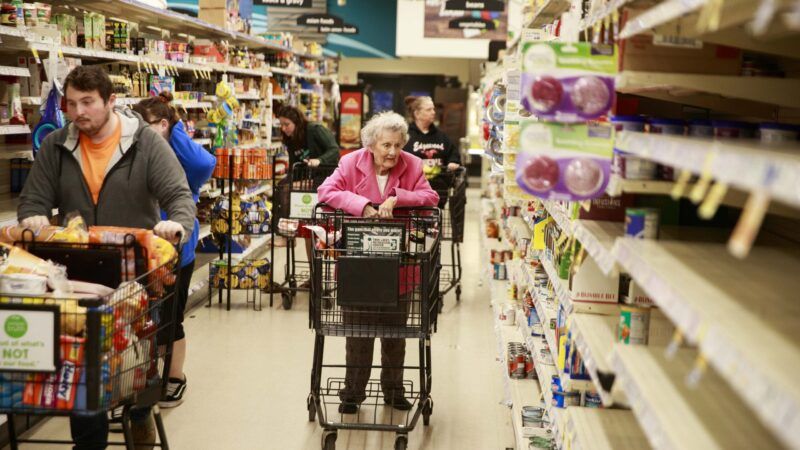FTC Fights Grocery Store Merger That May Bring Down Prices
Who needs better prices, products, and customer service?

While the Thanksgiving grocery shopping rush may be over, grocery stores Kroger and Albertsons are still eagerly waiting to find out if the Federal Trade Commission (FTC) will allow their proposed merger to proceed. After years of excessive inflation, the merger would unlock significant benefits for consumers: more product options, lower prices, and better customer service. Unfortunately, the FTC already appears to have made up its mind.
While the landmark deal is not expected to close until early 2024, it has already been reported that the FTC is not satisfied with the proposal, despite Kroger having agreed to divest over 400 stores in overlapping markets to C&S Wholesale Grocers. According to two sources with knowledge of the situation (including a former FTC policy director), the FTC will likely take Kroger and Albertsons to court. If true, the coming court battle will be unfortunate but not surprising.
Most legal experts believe the FTC is eager to flex its muscles in areas other than Big Tech. In recent years, the FTC has taken a much more aggressive approach to antitrust enforcement, inspired by the naive belief that everything "big is bad." Under the leadership of Chair Lina Khan, the Commission has developed a penchant for challenging mergers with little success.
Khan has recently made several statements that seem to express skepticism toward the Kroger-Albertsons merger. For instance, during an interview with a Las Vegas news station, Khan said, "If there's a merger that is presenting a lot of risk of reducing competition, may even create a monopoly…we need to weigh those risks, and especially given that some of these remedies in the past have failed." These comments are consistent with Khan's previous writings on food retail, where she has criticized "retail consolidation." However, she appears to undervalue the benefits of market scale in reducing per-unit costs and delivering consumers lower prices.
There is no evidence that the Kroger-Albertsons merger would result in any of the supposed harm she believes it would. For starters, a Kroger-Albertsons merger would not create a monopoly in the grocery market. According to a recent report by Retail Info Systems, Walmart remains the nation's largest grocer, controlling 17 percent of the grocery market. The second and third largest grocers are Amazon and Costco. Kroger and Albertsons are only a distant fourth and sixth with market shares of 4.4 percent and 2.2 percent, respectively.
Grocery stores have experienced a declining market share, while superstores and online competitors have grown. For example, like many traditional grocers, Kroger's market share has declined in recent years while Walmart's has increased. Even if Kroger and Albertsons were to merge, it's not clear that their combined market share wouldn't continue to decline. The merger would simply enable Albertsons and Kroger to bulk up and compete with larger competitors, like Walmart.
In addition, Kroger's decision to sell stores in overlapping markets where Albertsons operates means the merger would not increase concentration in any market. This has traditionally been enough for the FTC.
The national grocery market is also becoming more competitive, not less. No longer limited to brick-and-mortar supermarkets and independent grocery stores, the grocery market now includes a growing assortment of e-commerce stores, like Amazon, discount grocers like Aldi and Lidl, and delivery providers like FreshDirect and Instacart. These newer market entrants have fundamentally altered grocery shopping.
The merger will heighten competition among larger competitors, which will drive down prices for consumers. While a merger would not make Kroger and Albertsons the dominant industry players, it would allow them to compete more effectively with others, putting pressure on all major retailers to keep prices low as they fight to preserve their customer base. In fact, Kroger and Albertsons have indicated that the merger will generate $500 million in new cost savings for them that they plan to use to cut consumer prices. In addition, they plan to expand their lineup of affordable store brand products and spend $1.3 billion on improving customer service at Albertsons stores.
These are significant upsides to a Kroger-Albertsons merger that the FTC should not quickly ignore. Rather than creating a monopoly, such a merger would enhance competition, drive down prices, and deliver more choices for consumers. Allowing the merger would mean a cheaper Thanksgiving meal in years to come.


Show Comments (76)